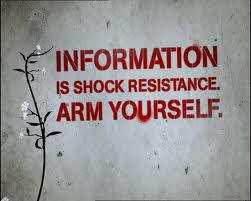The Shock Doctrine is a documentary adaptation of Naomi Klein's 2007 book, The Shock Doctrine: The Rise of Disaster Capitalism. The bestselling author shows how the global “free market” has exploited crises and shock for three decades, from Chile to Iraq. An investigation of disaster capitalism, based on Naomi Klein's proposition that neo-liberal capitalism feeds on natural disasters, war and terror to establish its dominance.
Based on breakthrough historical research and four years of on-the-ground reporting in disaster zones, The Shock Doctrine vividly shows how disaster capitalism -- the rapid-fire corporate re-engineering of societies still reeling from shock -- did not begin with September 11, 2001.
Whether covering Baghdad after the U.S. occupation, Sri Lanka in the wake of the tsunami, or New Orleans post-Katrina, she witnessed something remarkably similar. People still reeling from catastrophe were being hit again, this time with economic “shock treatment,” losing their land and homes to rapid-fire corporate makeovers.
The Shock Doctrine retells the story of the most dominant ideology of our time, Milton Friedman’s free market economic revolution, which produced many of the leading neo-conservative and neo-liberal thinkers whose influence is still profound in Washington today.
In contrast to the popular myth of this movement’s peaceful global victory, the film shows how it has exploited moments of shock and extreme violence in order to implement its economic policies in many parts of the World, from Latin America and Eastern Europe to South Africa, Russia, and Iraq.
New, surprising connections are drawn between economic policy, shock and awe warfare and covert CIA-funded experiments in electroshock and sensory deprivation in the 1950s, research that helped write the torture manuals used today in Guantanamo Bay. At the core of disaster capitalism is the use of cataclysmic events to advance radical privatization combined with the privatization of the disaster response itself.
The Shock Doctrine follows the application of these ideas through our contemporary history, showing in riveting detail how well-known events of the recent past have been deliberate, active theatres for the shock doctrine, among them: Pinochet's coup in Chile in 1973, the Falklands War in 1982, the Tiananmen Square Massacre in 1989, the collapse of the Soviet Union in 1991, the Asian Financial crisis in 1997 and Hurricane Mitch in 1998.

Related:
Based on breakthrough historical research and four years of on-the-ground reporting in disaster zones, The Shock Doctrine vividly shows how disaster capitalism -- the rapid-fire corporate re-engineering of societies still reeling from shock -- did not begin with September 11, 2001.
Whether covering Baghdad after the U.S. occupation, Sri Lanka in the wake of the tsunami, or New Orleans post-Katrina, she witnessed something remarkably similar. People still reeling from catastrophe were being hit again, this time with economic “shock treatment,” losing their land and homes to rapid-fire corporate makeovers.
The Shock Doctrine retells the story of the most dominant ideology of our time, Milton Friedman’s free market economic revolution, which produced many of the leading neo-conservative and neo-liberal thinkers whose influence is still profound in Washington today.
In contrast to the popular myth of this movement’s peaceful global victory, the film shows how it has exploited moments of shock and extreme violence in order to implement its economic policies in many parts of the World, from Latin America and Eastern Europe to South Africa, Russia, and Iraq.
New, surprising connections are drawn between economic policy, shock and awe warfare and covert CIA-funded experiments in electroshock and sensory deprivation in the 1950s, research that helped write the torture manuals used today in Guantanamo Bay. At the core of disaster capitalism is the use of cataclysmic events to advance radical privatization combined with the privatization of the disaster response itself.
The Shock Doctrine follows the application of these ideas through our contemporary history, showing in riveting detail how well-known events of the recent past have been deliberate, active theatres for the shock doctrine, among them: Pinochet's coup in Chile in 1973, the Falklands War in 1982, the Tiananmen Square Massacre in 1989, the collapse of the Soviet Union in 1991, the Asian Financial crisis in 1997 and Hurricane Mitch in 1998.

Related:
- DEBTOCRACY International Version (Documentary)
- CATASTROIKA Privatization goes public (Documentary)
- The Money Masters (Documentary): How Banks Create Money Out Of Thin Air
- The Corporation (2003) Award-winning Documentary
- The American Dream - The Story of Your Enslavement
- Secret Societies the String Pullers (Documentary) - Skulls, Bilderbergers and The CFR
- Documentaries: Esoteric Agenda (2008) - Kymatica (2009)
- Apologies Of An Economic Hitman (Documentary)
- The Collective Evolution III: The Shift [Documentary 2014]
















COMMENTS